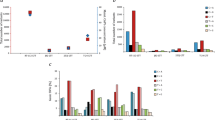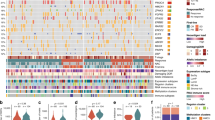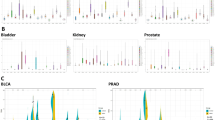Abstract
Expression of the MRP gene has been demonstrated in vitro to be a casual factor in non-P-glycoprotein-mediated multidrug resistance, and is implicated in resistance to a number of the chemotherapeutic agents currently used in the treatment of high-grade transitional cell carcinoma (TCC) of the bladder (doxorubicin, epirubicin and vinblastine). Using a sensitive RT-PCR-based technique, we have quantified MRP mRNA levels in a series of untreated TCC (n=24), normal bladder (n=5) and control tissue and cell line samples. MRP mRNA was widely expressed and detectable in all samples analysed, with considerable (up to 190-fold) variation observed between individual tumour samples. MRP mRNA levels found in TCC samples were lower than those determined for normal peripheral mononucleocyte (2.3-fold) and testis (4.1-fold) samples, previously reported to be high-expressing tissues, and varied over a similar range to that observed in normal bladder samples. Results indicate that MRP mRNA levels in a greater proportion of high-grade (G3) bladder tumours (55%, 6/11) are significantly reduced (P=0.018) compared with low- and moderate-grade (G1/2) bladder tumours (8%, 1/13), and suggest that MRP mRNA levels frequently become reduced as a consequence of tumour progression to advanced, poorly differentiated disease. No correlation was apparent between MRP and MDR1 mRNA levels, thus providing no evidence to suggest common regulation of the two genes. In a limited number of patients, no evidence was found to support a role for MRP mRNA levels as a determinant of response to chemotherapy in patients being uniformly treated with either cisplatin-methotrexate-vinblastine (n=6) or epirubicin-cisplatin-methotrexate (n=4) regimens. Similarly, no overall pattern of altered MRP mRNA expression was observed following chemotherapy in four patients from whom post chemotherapy biopsies were taken. This study provides a useful pilot investigation regarding the level, variation and pattern of MRP mRNA expression in TCC of the bladder, and suggests that further studies to establish the clinical significance of these variations are required.
This is a preview of subscription content, access via your institution
Access options
Subscribe to this journal
Receive 24 print issues and online access
$259.00 per year
only $10.79 per issue
Buy this article
- Purchase on Springer Link
- Instant access to full article PDF
Prices may be subject to local taxes which are calculated during checkout
Similar content being viewed by others
Author information
Authors and Affiliations
Rights and permissions
About this article
Cite this article
Clifford, S., Neal, D. & Lunec, J. Alterations in expression of the multidrug resistance-associated protein (MRP) gene in high-grade transitional cell carcinoma of the bladder. Br J Cancer 73, 659–666 (1996). https://doi.org/10.1038/bjc.1996.115
Issue Date:
DOI: https://doi.org/10.1038/bjc.1996.115



